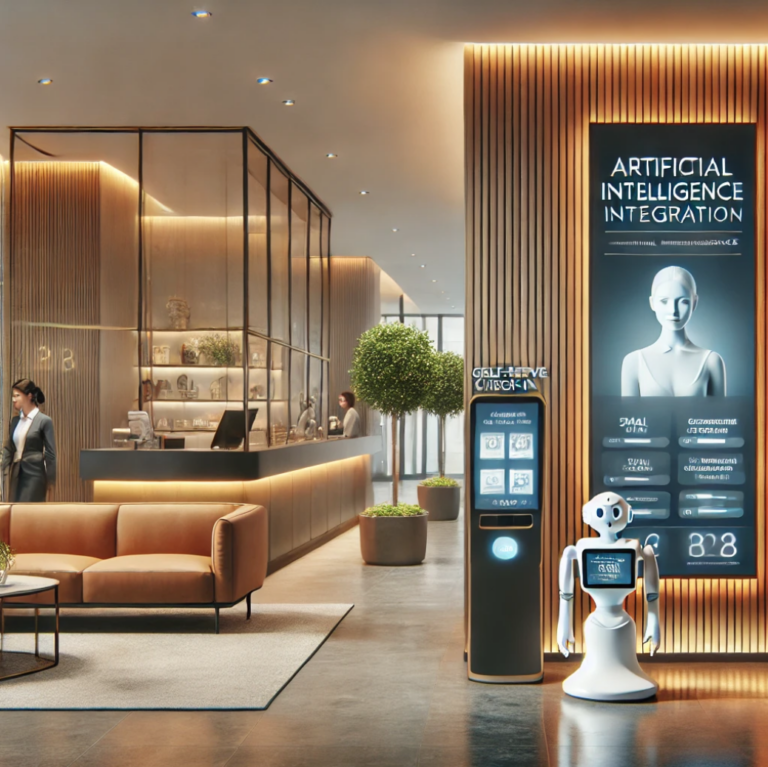Artificial intelligence (AI) is revolutionizing industries worldwide, and using AI in Hotels (hospitality sector) is no exception. Hotels are now embracing AI-driven solutions to enhance customer experience, streamline operations, and improve profitability. In this post, we’ll explore how AI is transforming the hotel industry, examining real-world applications and benefits it brings to hoteliers and guests alike. By implementing AI technologies, hotels can offer personalized experiences, increase operational efficiency, and respond to emerging challenges with greater agility.
The Rise of AI in the Hospitality Industry
AI in the hotel industry has rapidly evolved over the last few years, driven by advancements in machine learning, data processing, and robotics. The demand for AI applications surged as hotels sought to improve customer service, reduce operational costs, and differentiate their brand in an increasingly competitive market. By leveraging AI, hotels can enhance various aspects of their services, from personalized guest experiences to efficient back-office management.
1. AI-Powered Personalization (best way to apply AI in hotels)
Personalization is one of the most powerful applications of AI in hotels. With access to vast amounts of data from past bookings, preferences, and online interactions, AI can help create tailor-made experiences for guests. Here’s how AI-powered personalization benefits hotels:
- Customized Recommendations: AI algorithms can analyze a guest’s preferences and suggest specific amenities, dining options, and even activities they may enjoy during their stay. For instance, if a guest has previously booked spa treatments or golf sessions, the hotel can proactively offer similar services.
- Dynamic Pricing: Hotels can use AI to adjust room prices based on demand, guest history, and competitor rates. AI-powered dynamic pricing helps hotels maximize revenue by offering competitive yet profitable rates.
- Enhanced Marketing Strategies: AI can segment guest profiles, enabling targeted marketing campaigns. For example, a hotel can use AI to identify loyal customers who prefer weekend getaways and target them with special weekend offers.
2. Voice-Activated Assistants and In-Room Automation
Improving guest experience is one of the best ways to use AI in Hotels. Voice-activated AI assistants, such as Amazon Alexa and Google Assistant, are now common in hotel rooms, providing guests with an intuitive and hands-free way to interact with the hotel’s services. In-room automation powered by AI can control lighting, temperature, and entertainment options, allowing guests to personalize their space with ease.
- Voice Commands for Room Controls: Guests can adjust room temperature, lights, and even request housekeeping through voice commands. This adds a level of convenience that many travelers appreciate, especially after a long journey.
- Information and Recommendations: Voice assistants can provide information about the hotel, local attractions, and nearby dining options, acting as a 24/7 concierge.
- Smart Energy Management: In-room automation powered by AI can help hotels save energy. When rooms are unoccupied, AI can adjust the temperature and lighting to minimize energy usage, contributing to sustainable operations.
3. Chatbots for 24/7 Guest Assistance using AI in hotels
AI-powered chatbots have become an essential tool for hotels to provide quick, efficient customer support. Available 24/7, chatbots can handle multiple inquiries simultaneously, providing guests with instant responses to common questions.
- Booking Assistance: Chatbots can assist with reservations, answer questions about room availability, and help guests make modifications to their bookings.
- Handling Common Queries: Guests often have questions about check-in times, Wi-Fi availability, or hotel amenities. Chatbots can answer these questions immediately, reducing the workload on front-desk staff.
- Multilingual Support: Many AI chatbots can communicate in multiple languages, making it easier for hotels to accommodate guests from diverse backgrounds.
4. Data Analytics and Predictive Maintenance
AI-driven data analytics allows hotels to gain insights into customer preferences, operational efficiency, and even predict maintenance needs.
- Customer Insights: AI analytics can identify patterns in guest preferences, helping hotels offer targeted promotions and personalized services. For example, if data shows that many guests visit the gym early in the morning, the hotel can adjust its housekeeping schedule to accommodate this.
- Predictive Maintenance: AI can predict when equipment in the hotel (such as elevators, HVAC systems, or kitchen appliances) might need maintenance based on usage patterns and previous repair records. This reduces downtime, enhances safety, and extends the lifespan of hotel assets.
5. Robotics for Housekeeping and Service Delivery
Robots are being deployed in hotels to assist with housekeeping, room service, and even front-desk services. They can handle repetitive tasks, allowing human staff to focus on more complex, guest-facing activities.
- Room Service Delivery: Some hotels use robots to deliver items like towels, toiletries, or room service orders. This not only adds novelty but also frees up staff for more personalized guest interactions.
- Automated Cleaning Robots: Robotic vacuums and floor cleaners are becoming common, ensuring consistent cleaning quality and freeing housekeeping staff for more intricate tasks.
- Social Robots for Guest Interaction: Certain hotels use social robots to greet guests, answer questions, or guide them to specific locations within the hotel. While this is still an emerging trend, it can enhance guest experience through novelty and convenience.
6. Enhancing Security and Privacy with AI
AI technologies such as facial recognition and behavior analysis can enhance hotel security. These systems can monitor for unusual activities, protect guest privacy, and improve emergency response.
- Facial Recognition for Check-In: Some hotels use facial recognition to streamline the check-in process, allowing guests to bypass traditional check-in desks. This also helps prevent unauthorized access.
- Behavioral Monitoring for Security: AI-powered cameras can analyze guest behavior in public areas to detect potential security risks. For example, if someone is lingering near restricted areas, security personnel can be alerted.
- Data Privacy Protections: With the rise of AI, hotels must also prioritize data privacy. Advanced encryption and AI-driven data security measures help hotels protect guest information while delivering a personalized experience.
7. Revenue Management and Forecasting
AI plays a critical role in helping hotels maximize revenue by predicting demand and optimizing pricing strategies.
- Occupancy Prediction: By analyzing historical booking data and external factors like events and weather, AI can predict occupancy rates, allowing hotels to adjust prices accordingly.
- Revenue Optimization: AI algorithms consider multiple variables, including booking patterns and room type popularity, to recommend pricing adjustments. This enables hotels to maximize revenue without alienating potential guests with unpredictable pricing.
Real-World Examples of AI in Hotels
1. Hilton’s “Connie” Robot Concierge: Hilton partnered with IBM to create Connie, a robot concierge powered by IBM’s Watson AI. Connie assists guests with directions, restaurant recommendations, and hotel information, creating a unique, interactive experience for visitors.
2. Marriott’s Chatbot for Customer Service: Marriott has developed a chatbot accessible via Facebook Messenger, allowing guests to book rooms, check reservations, and make special requests. The chatbot supports multiple languages, enhancing accessibility for international guests.
3. Aloft’s Voice-Activated Rooms: Aloft Hotels introduced voice-activated rooms where guests can control lighting, temperature, and even entertainment options by simply speaking commands. This technology provides guests with a high-tech, personalized experience.
4. Yotel’s “YOBOT” Luggage Storage Robot: Yotel uses a robot named YOBOT to handle guest luggage storage, allowing guests to check in their bags seamlessly. This robotic concierge enhances convenience and frees up staff for other responsibilities.
Challenges and Considerations when using AI in hotels
While AI offers tremendous benefits, hotels must consider potential challenges:
- Privacy Concerns: As AI collects vast amounts of data, hotels must prioritize data protection and comply with privacy regulations to gain guest trust.
- High Initial Costs: Implementing AI technologies can be costly. Hotels need to weigh the long-term benefits against the initial investment.
- Staff Training and Adaptation: Staff members must be trained to use AI tools effectively. Ensuring a smooth transition requires comprehensive training and a focus on change management.
AI is transforming hotels by enhancing guest experiences, optimizing operations, and enabling hotels to offer sustainable and innovative solutions.
From personalized services to predictive maintenance, AI allows hotels to meet the demands of modern travelers while achieving operational excellence.
As AI technology advances, the potential for further innovation in hotels is limitless, promising a future where guest experiences are not only enhanced but also unforgettable. Embracing AI today means staying competitive, appealing to tech-savvy guests, and setting a new standard in hospitality.


